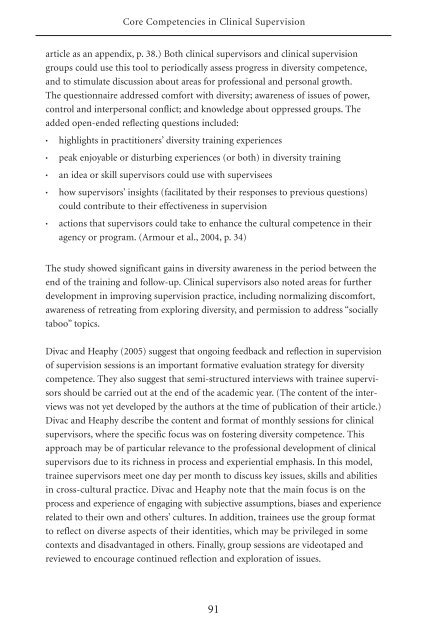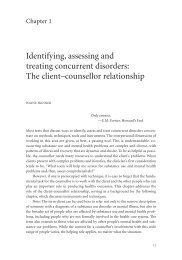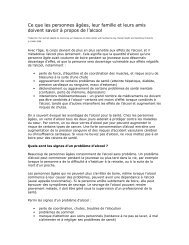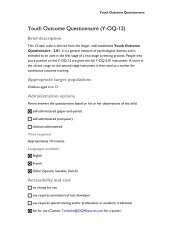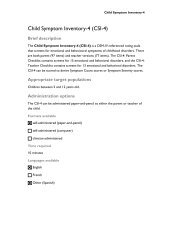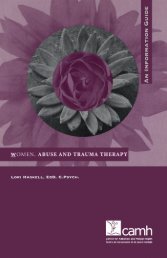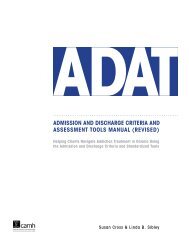Clinical Supervision Handbook - CAMH Knowledge Exchange ...
Clinical Supervision Handbook - CAMH Knowledge Exchange ...
Clinical Supervision Handbook - CAMH Knowledge Exchange ...
You also want an ePaper? Increase the reach of your titles
YUMPU automatically turns print PDFs into web optimized ePapers that Google loves.
Core Competencies in <strong>Clinical</strong> <strong>Supervision</strong><br />
article as an appendix, p. 38.) Both clinical supervisors and clinical supervision<br />
groups could use this tool to periodically assess progress in diversity competence,<br />
and to stimulate discussion about areas for professional and personal growth.<br />
The questionnaire addressed comfort with diversity; awareness of issues of power,<br />
control and interpersonal conflict; and knowledge about oppressed groups. The<br />
added open-ended reflecting questions included:<br />
• highlights in practitioners’ diversity training experiences<br />
• peak enjoyable or disturbing experiences (or both) in diversity training<br />
• an idea or skill supervisors could use with supervisees<br />
• how supervisors’ insights (facilitated by their responses to previous questions)<br />
could contribute to their effectiveness in supervision<br />
• actions that supervisors could take to enhance the cultural competence in their<br />
agency or program. (Armour et al., 2004, p. 34)<br />
The study showed significant gains in diversity awareness in the period between the<br />
end of the training and follow-up. <strong>Clinical</strong> supervisors also noted areas for further<br />
development in improving supervision practice, including normalizing discomfort,<br />
awareness of retreating from exploring diversity, and permission to address “socially<br />
taboo” topics.<br />
Divac and Heaphy (2005) suggest that ongoing feedback and reflection in supervision<br />
of supervision sessions is an important formative evaluation strategy for diversity<br />
competence. They also suggest that semi-structured interviews with trainee supervisors<br />
should be carried out at the end of the academic year. (The content of the interviews<br />
was not yet developed by the authors at the time of publication of their article.)<br />
Divac and Heaphy describe the content and format of monthly sessions for clinical<br />
supervisors, where the specific focus was on fostering diversity competence. This<br />
approach may be of particular relevance to the professional development of clinical<br />
supervisors due to its richness in process and experiential emphasis. In this model,<br />
trainee supervisors meet one day per month to discuss key issues, skills and abilities<br />
in cross-cultural practice. Divac and Heaphy note that the main focus is on the<br />
process and experience of engaging with subjective assumptions, biases and experience<br />
related to their own and others’ cultures. In addition, trainees use the group format<br />
to reflect on diverse aspects of their identities, which may be privileged in some<br />
contexts and disadvantaged in others. Finally, group sessions are videotaped and<br />
reviewed to encourage continued reflection and exploration of issues.<br />
91


